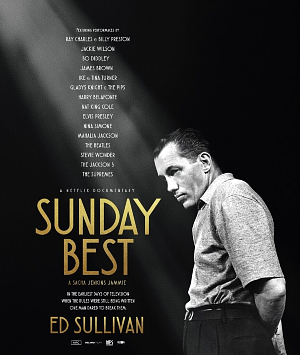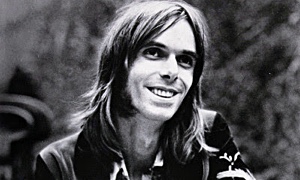Home » Jazz Articles » Film Review » Sunday Best: A Netflix Documentary
Sunday Best: A Netflix Documentary

An amazingly timely Netflix release, it tells a story of aspiring to high ideals, an uplifting film on every level… a story of moral fortitude with great music and unimaginably (at the time) dynamic performances.
 Ed Sullivan, at one time was the most renowned name in US television. Most of us hear that name and think of Elvis Presley and his electrifying game-changing performance in 1956. Few of us will ever forget the hip-shaking gyrations that captivated a nation. Nothing like it had ever been seen on national television. Or so the myth goes, as Elvis premiered on the Milton Berle Show a few months earlier. Or we think of and remember his introduction of The Beatles in February 1964, the first opportunity for unrestrained joy in the wake of the assassination of President Kennedy. But he began his career as a sports columnist for the New York Daily News, not as an influencer in the rather staid entertainment industry, but as a keen observer at the time major league baseball introduced the first black player. An unlikely choice to host the Harvest Moon Ball, a dance competition featuring a bevy of black entertainers, CBS executives decided he was the man for their planned Sunday night entertainment show—The Toast of the Town—as the Ed Sullivan Show was originally known.
Ed Sullivan, at one time was the most renowned name in US television. Most of us hear that name and think of Elvis Presley and his electrifying game-changing performance in 1956. Few of us will ever forget the hip-shaking gyrations that captivated a nation. Nothing like it had ever been seen on national television. Or so the myth goes, as Elvis premiered on the Milton Berle Show a few months earlier. Or we think of and remember his introduction of The Beatles in February 1964, the first opportunity for unrestrained joy in the wake of the assassination of President Kennedy. But he began his career as a sports columnist for the New York Daily News, not as an influencer in the rather staid entertainment industry, but as a keen observer at the time major league baseball introduced the first black player. An unlikely choice to host the Harvest Moon Ball, a dance competition featuring a bevy of black entertainers, CBS executives decided he was the man for their planned Sunday night entertainment show—The Toast of the Town—as the Ed Sullivan Show was originally known. A rather stiff, almost wooden-like, at times expressionless personality, he was the butt of many jokes. His smile was thought to resemble a person sucking on a lemon. But his love for people, and his guests, could not be disguised as he grew into and found comfort as the host of a show he molded into his own image.
Bill "Bo Jangles" Robinson was one of the first black stars Sullivan elevated into the public eye of white America. Though Smokey Robinson, Berry Gordy and most notably, Harry Belafonte—prominent blacks in the entertainment industry—all commented on of how much Sullivan did for them, and how fearless he was in the face of potential white backlash, when Bo Jangles died, Sullivan organized a huge funeral in Harlem befitting the status of a fallen king. According to Dionne Warwick, "He cared." Sullivan grew up in Harlem when it was home to a growing population of Irish and Jewish immigrants. Familiar with the hardships endured by his family, he understood the meaning of right and wrong, and decided racial prejudice had no place in his vision of the modern America he helped to shape. Though some considered his actions as "a plot to undermine the standards of the Anglo-Saxon race" (Governor Eugene Talmadge, Georgia), with threats to galvanize Southern viewers to boycott the show, Sullivan responded. "Statements by Governor Talamage that Negro performers be barred from TV shows on which white performers appear is both stupid and vicious."
On October 11, 1953, Harry Belafonte appeared on Sullivan's show despite objections by CBS, denouncing the black activist/singer as a Communist agitator. Prior to the prospective date, Sullivan scheduled a meeting with the singer and confronted him with these accusations. Belafonte denied nothing, agreeing that he was everything that CBS had accused him of, but added that black resistance was akin to how the Irish fought for equality in a nation of immigrants. Clearly impressed by the singer's regal bearing and simple words, two hours later Belafonte's agent called to say that Sullivan had scheduled his appearance for the following week.
Introducing Bo Diddley in 1955, he noted that anything good in American entertainment caught on first in Harlem, arranging for a well-known black DJ, Dr. Jive, to introduce Diddley to white America along with a pulsating, throbbing beat popularized in the song bearing his name. Sullivan invited Nat King Cole, renowned as a baritone vocalist for pop standards, to play the piano, and display the skills that black music fans were all too familiar with. The amazing Miriam Makeba also performed, singing in her native African language for the white studio audience who were visibly enthralled with her dynamic performance. To Motown executive Berry Gordy, Sullivan's show was the ultimate dream come true as black artists from Stevie Wonder at age 13 to The Temptations and the Jackson 5 to the glamorous Diana Ross with The Supremes appeared. It became the highest-rated show in the country. According to Oprah, seeing black entertainers ignited the imaginations of all black kids watching. These stars looked like them. Told by CBS to avoid physical contact with his guests, he shook hands with Joe Louis, embraced others and even gave a light kiss on the lips to a black female performer. Punctuated by black and white footage—scenes of KKK rallies, Governor Talmage maintained his allegiance to white supremacy, Rosa Parks' statements to the press after she was arrested in Selma to the inauguration of President Kennedy (which Sullivan attended with his wife) and the announcement of his assasination by Walter Cronkite of CBS news, the documentary clearly plots Sullivan's heartfelt belief in racial equality with the sordid back drop of American history as a constant theme. Though sponsors like Lincoln Mercury withdrew their support, the show readily found new advertisers. The power of the people and their taste for music and entertainment had spoken.
His voice is heard throughout the film with clips from interviews and public statements. A disclaimer at the beginning explains that some of these vocal clips were recreated, taken verbatim from letters he had written himself or columns and articles with direct quotes.
As the country changed, with some ideals forsaken as others came in vogue, ratings dropped in the early '70s. In an interview toward the end of the show's run, he was asked what he would do if it ended. "I would be lost without it," he responded. The show was discontinued in 1971 after 1,100 episodes, for which he had handpicked more than 10,000 performers, and three years later, he died ... on a Sunday night. Given current events and the pressures placed on the media to which they all seem to kowtow and buckle, one wonders how long a stand-up person like Sullivan would last these days. Ask Stephen Colbert—he would have an answer. An amazingly timely Netflix release, it tells a story of aspiring to high ideals, an uplifting film on every level—a story of moral fortitude with great music and unimaginably (for middle Americans at the time) dynamic performances.
Tags
Thomas Cole
Publisher
Elvis Presley
The Beatles
Bill "Bo Jangles" Robinson
smokey robinson
Harry Belafonte
Dionne Warwick
Bo Diddley
Nat King Cole
Miriam Makeeba
Little Stevie Wonder
The Temptations
Jackson 5
Diana Ross
The Supremes
DVD/Film Reviews
Film Review
Sunday Best
Ed Sullivan
The Ed Sullivan Show
Netflix
Netflix Documentary
Margo Precht Speciale
PREVIOUS / NEXT
Support All About Jazz
 All About Jazz has been a pillar of jazz since 1995, championing it as an art form and, more importantly, supporting the musicians who make it. Our enduring commitment has made "AAJ" one of the most culturally important websites of its kind, read by hundreds of thousands of fans, musicians and industry figures every month.
All About Jazz has been a pillar of jazz since 1995, championing it as an art form and, more importantly, supporting the musicians who make it. Our enduring commitment has made "AAJ" one of the most culturally important websites of its kind, read by hundreds of thousands of fans, musicians and industry figures every month.

























